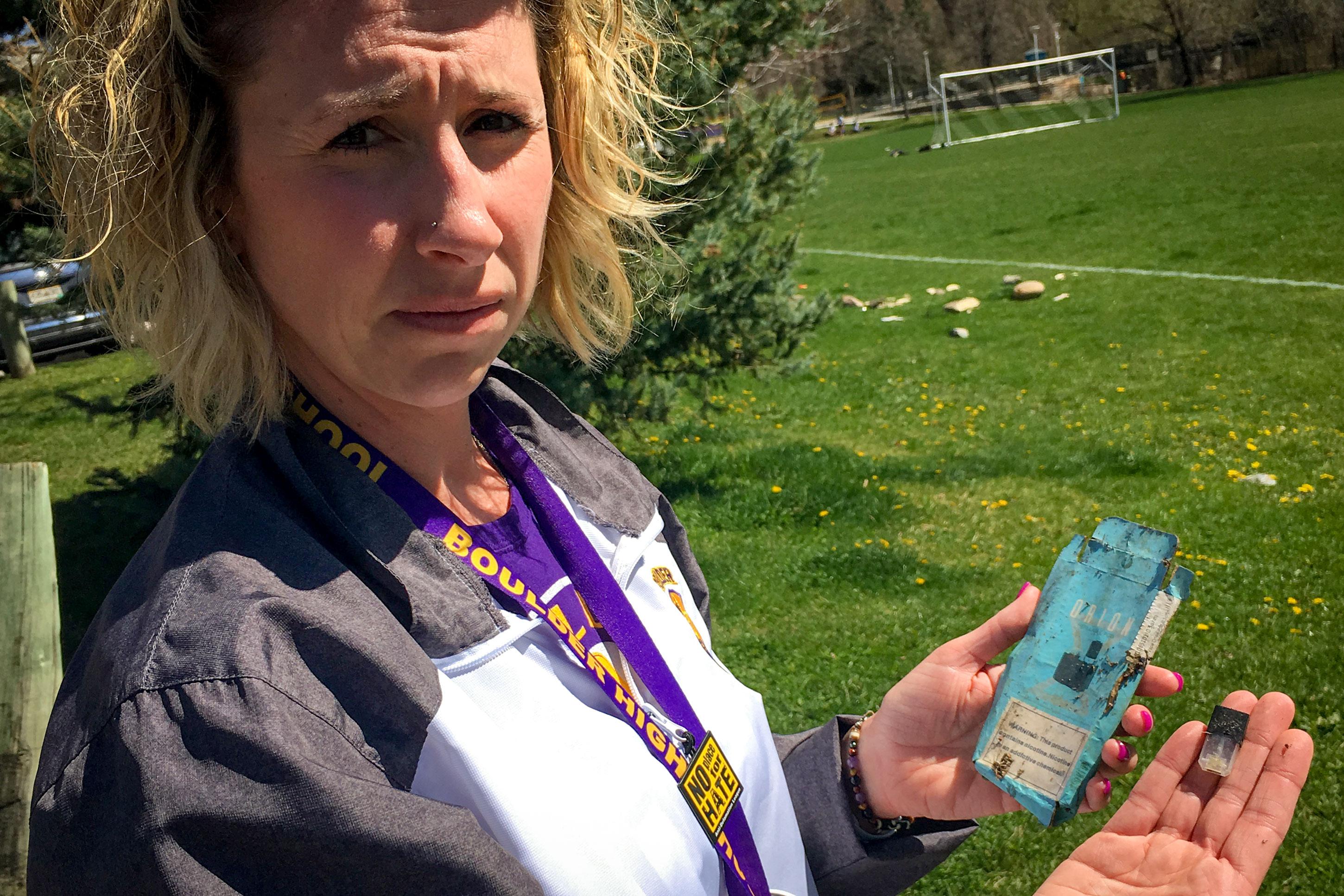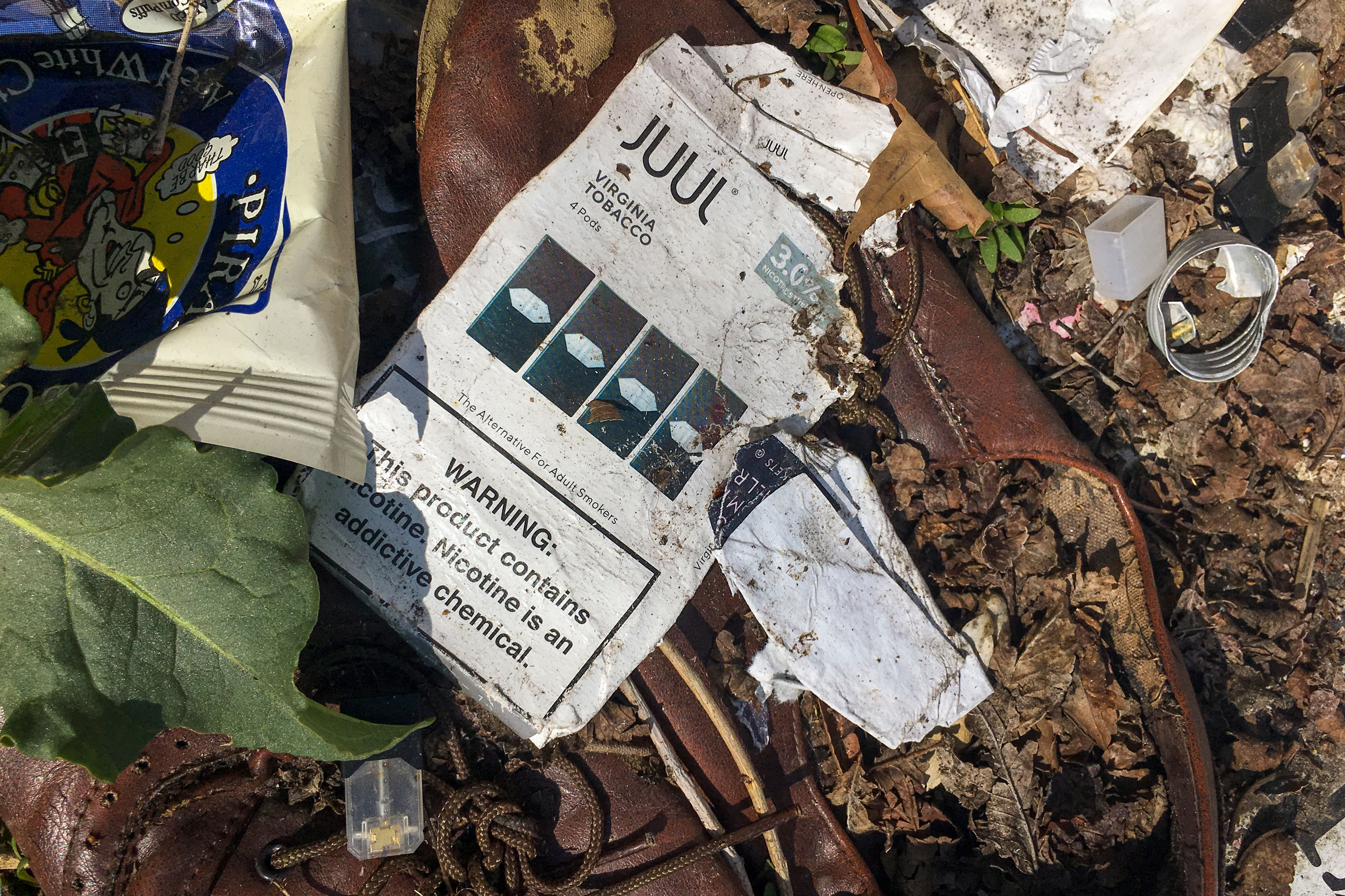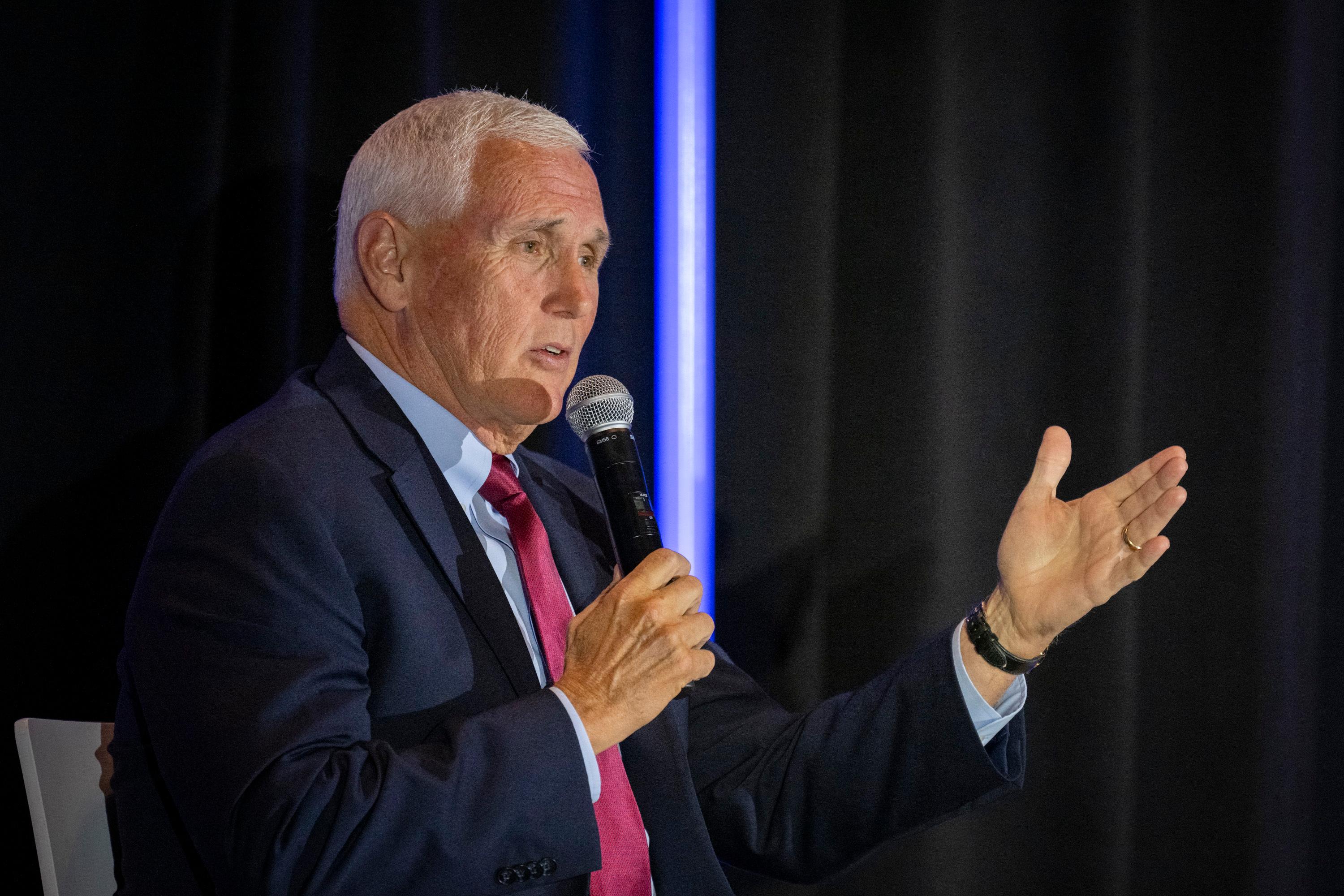

Kristen Lewis keeps a brown cardboard box in her office at Boulder High School. It’s filled with vape pens like JUULs, the leading brand of e-cigarettes, dozens of the pods that carry nicotine liquid, and a lonely box of Marlboros.
“This is what I call the box of death,” she said. “This is everything that we’ve confiscated.”
Lewis, the assistant principal, said school policy prohibits students smoking cigarettes and vaping electronic cigarettes on school grounds. But still, she and other school employees regularly find them in students’ hands and scattered all around.
Colorado topped the list for teen vaping in 2018 and Boulder is one of the hot spots. The teen vaping epidemic has created all sorts of health problems. It’s also created a whole new environmental problem in discarded pens and the abundant pods that come with them.
The pod is a small plastic cartridge that holds the nicotine liquid. It snaps into the smoking device, which looks like a flash drive. In 2017, people bought more than 16 million of the devices in the U.S. and that figure doesn’t include the pods.

Where those go after they’re used is becoming a huge problem for waste managers — and school administrators.
As we walked around Boulder High, custodian Allen Chavez showed me where he finds empty JUUL pods. Students stuff them between furniture cushions. “Most of these things that we find mostly are in the cracks of these chairs here,” Chavez said.
In a boy’s bathroom, Chavez pointed to a small hole in the wall, where students deposit finished pods.
“I’ve caught a couple of guys,” said Chavez, but students will often say “‘it wasn’t me.’”
John Lorden, a senior in a baseball cap, said students in Boulder are generally very environmentally aware, but with vape pens and pods, “it’s a little piece of plastic you’re just dumping, so I don’t really think people think much of it.”
Another senior, Angel Ocon, a stout football player, has seen plenty of discarded electronic cigarette pods under the bleachers of the school stadium. “If you use vapor or JUUL or something, all you’re gonna think about is, like, getting the buzz, not where you’re going to throw away your stuff,” Ocon said.
A Growing River Of E-cigarette Waste
Those sleek, high-tech e-cigarettes are actually a growing hazardous waste problem. Shelly Fuller, Boulder County’s Hazardous Materials program manager, said they shouldn’t be tossed in the trash.
Instead, they should be brought to a hazardous waste or recycling center like hers.
At a battery sorting table, she shows off a bucket of e-cigarette items. About two years ago she started seeing a new tributary in the waste stream of vaporizers, pods and batteries; people were dropping them off and they were showing up in the trash.
“If you’re coming in to drop off paint or household chemicals or anything like that you might also bring in your vaping devices,” Fuller said.
One time it was a parent getting rid of a soda box full of refillable plastic containers for liquids used in vaping devices. They’d found them in their child’s room and Fuller said their feeling was, “‘I just want to get this out of my house. I don’t want them to have access to this.’”

Different components of the e-cigarettes get treated separately. Vaping devices have batteries, usually lithium-ion. She ships them to a recycling facility in Arizona. Fuller said most e-liquids contain nicotine, which goes to a facility on Colorado’s eastern plains for recycling or proper disposal, such as incineration.
“We’re shipping it off with our poisons or toxics,” Fuller said. Nicotine is considered an acute hazardous waste, she said, as small doses can be lethal to a human, or a small animal.
The Ripple Effect
The state has seen incidents of nicotine poisoning from e-cigarettes. The Rocky Mountain Poison and Drug Center reported almost 250 calls from 2013 to 2018 — of which more than half were in children younger than five.
Brittany Carpenter, a Boulder County tobacco education specialist, said the candy-like e-liquid flavors can attract kids and pets.
“It may be sitting out on a coffee table and there’s access to that and then either it spills or they open it and then it’s being absorbed through the skin,” she said. “So it’s being ingested or absorbed some way.”
An incidence of poisoning might result in a doctor’s visit or the occasional trip to the hospital. One JUUL pod contains 20 cigarettes worth of nicotine, about the same as a pack of cigarettes. Carpenter said research on what’s in e-cigarette liquid in a pod is still in its infancy, but besides nicotine, “there’s some heavy metals including lead, tin and nickel.”
All the toxic things in an e-cigarette can end up in the ground or water if they’re not properly disposed of, said Colorado State University environmental health researcher John Volckens. “As the battery degrades, the compounds in the battery can leach into water nearby,” he said.
Like a lot of products, Volckens said, once an e-cigarette or pod is thrown away it doesn’t really go away. It just goes somewhere else.
“This is really a contributor to a larger e-waste problem we have as a society,” he said. Yet, there is no broad industry push to recycle its products, including pods.

“There is no environmental damage compared to all of the household products that we throw out in the garbage every day,” said Gregory Conley, president of the American Vaping Association. “Most pods, by the time someone wants to recklessly throw them on the ground, they’ve been vaped and there’s little to no liquid left in that pod.” He said it’s really up to consumers to take care of their waste.
JUUL, the market leader, declined interview requests. Its website says JUUL pods are not meant to be refilled and can be thrown away, which is contrary to what Boulder County advises. Its battery-powered devices should be disposed of like cell phones or other electronics.
Looking For A Fix
One Boulder vape shop is trying to stem the growing river of waste and inform customers about the problem. Boulder Vapor House, across from the University of Colorado campus, hands out cards from Boulder County that explain proper e-cigarette disposal and collects leftover pods and other products.
“Our main message is ‘keep Boulder green’ and keeping trash off the street,” said shop owner Ginger Tanner. The shop gives customers a chance to win a prize if they turn in used pods and pens. “We don’t like seeing cigarette butts and we really don’t like to see plastic hazardous waste on the ground equally as much.”
Tanner estimates in the last year, they’ve collected and disposed of 20,000 e-cigarette pods.
Boulder’s schools and its health and waste management departments are also working on the issue. They’ve teamed up on a website about e-cigarettes and vaping that includes information on safe disposal.
“This is a whole new thing that really, I don’t think many people have even given any thought to,” said Stephanie Faren, director of health services for Boulder Valley School District.

At the end of my visit to Boulder High, Assistant Principal Kristen Lewis showed me around the outside of the school. In the school parking lot, it didn’t take long until we spotted some e-cigarette trash.
“This one is an Orion vape device, it looks like,” said Lewis, as she picked up the packaging of one device. A little further on, she spotted another pile. “Yep, more JUUL pods,” she said.
Lewis finds them wherever kids hang out: the school parking lot, along the edge of nearby Boulder Creek and in the yards of homes across the street from the school.
“It just talks about how much this has become a part of our students’ lives,” she said. “And that’s what’s scary. When they called it an epidemic, it really has become an epidemic in our schools, and not just here at Boulder High, but every high school in the nation is really dealing with this.”
The proof of the problem is all around.









